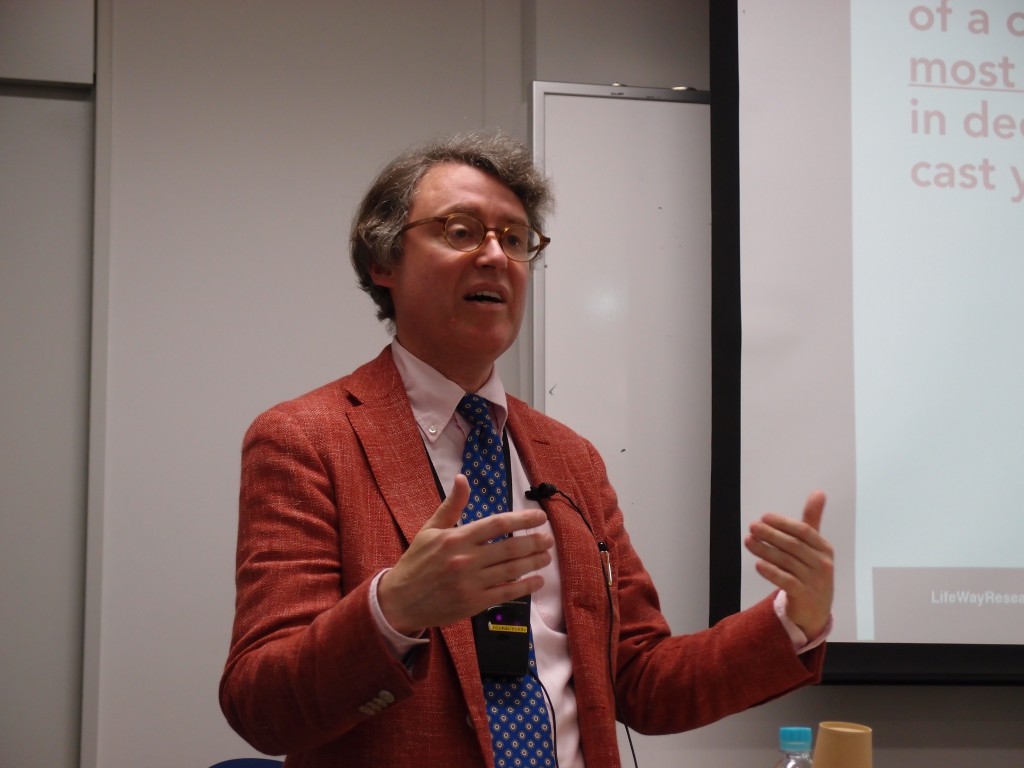Center for Interdisciplinary Study of Monotheistic Religions(CISMOR)Doshisha University
> Public Lectures > 【For Students and Academics】Conservative Christians in Donald Trump’s AmericaPublic Lectures
11th CISMOR Seminar
【For Students and Academics】Conservative Christians in Donald Trump’s America
| Date: |
2017/05/25 17:00-18:30 |
|---|---|
| Place: | Room RY410, Ryoshin-kan, Imadegawa Campus, Doshisha university |
| Lecture: | Gavin James Campbell (Professor, Graduate School of Global Studies, Doshisha University ) |
| Summary: | |
|
Regarding the report that “81% of US evangelicals supported President Trump, higher than that for George W. Bush or Bill Clinton”, Professor Campbell asked “Why did 81% of evangelicals vote for President Trump?” [NB: It was actually 81% of white evangelicals]. Campbell noted that “Each evangelical community in the US has different movements, and they are not uniform.” By introducing each group of evangelicals and by using graphs to show commonalities and differences between groups and across states, he revealed the extent of this variance. Furthermore, he pointed out that while there were ardent Trump supporters within the evangelical movement, at the same time those that didn’t support him clearly also had influence. Following his detailed research, Professor Campbell was able to present the fundamental philosophy, sentiments and power of US evangelicals and to conclude that they are not Trump supporters. The main questions from the seminar attendants were as follows: ① Are there any differences between the support given by people according to their level of education, for example between university graduates or those with higher education compared to those who didn’t go to university or who have had relatively little education? ② Isn’t the Trump policy position of aiming to reduce such government support as foreign humanitarian assistance at odds with mainstream evangelicalism in many countries, which has a preference for crossnational support? ③ You [Professor Campbell] mentioned that even within the evangelical movement there is diversity, but hasn’t the diversity been there since the time of President Obama? (E.g. ‘Religious Left’, ‘Liberal Evangelicals’, etc.) ④ Regarding the result, I [a seminar attendee] think that Trump won because 81% of white evangelicals, who make up 25% of the American population, voted for him. In this sense, can it be said that white evangelicals won it for Trump? ⑤ It had been assumed that global issues were more important to US evangelicals than abortion or homosexuality, so why in this election were the latter more important? ⑥ If there is any change in the level of evangelical support by the time of the next election (for example, a reduction in support from 80% to 50%), would you expect a change in the next presidential election? Or would you expect the same result as this time? ⑦ If Trump supports evangelical groups on [repealing] the Johnson Amendment (a provision regarding a US tax code) what will happen? Or is there any movement to prevent this repeal? ⑧ To start with, what is the clear definition of ‘evangelical’? Professor Campbell answered the above questions by referring again to his introductory data and by quoting several passages representing the evangelical position from each of the New Testament gospels. He also stated that he will be continuously analysing and clarifying these issues in his ‘Religion in American History’ course (School of Theology, Doshisha University, Autumn Term 2017). Translated by Masaki Nagata |
|
| The seminar series is open for students and academics. | |
|
20170525poster |
|

